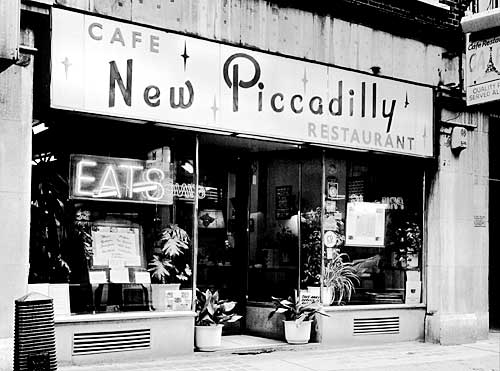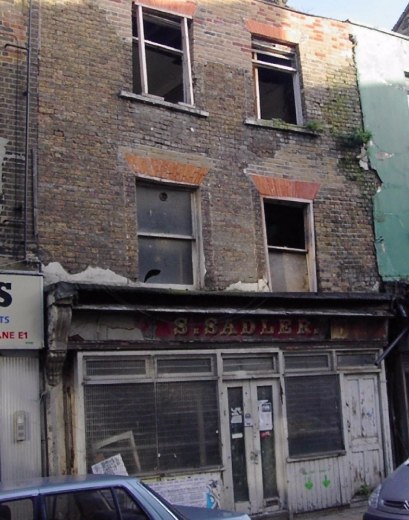CAFE CULTURE
Thu. February 19, 2004Categories: Abstract Dynamics

A few connections between recent (or fairly recent) postings. Luka posts a link to DerelictLondon.com. Robin has a link to Classic Cafes.co.uk .
What is it in us that cleaves to the derelict, the deserted, and the dilapidated? It’s a very English thing. ‘This is where England most truly excels,’ notes Adrian Maddox, the proprietor of Classic Cafes.co.uk in his essay-cum-compendium piece, Britannia Moribundia , ‘in all the characterful shabbiness of its drizzled parks, soiled launderettes, frayed tailors, abject chemists, sparse barbers, bare foyers, dun pubs, weary Legion halls… and cowed solitary cafes.’
For Julie Burchill, whose Guardian piece on Eastbourne is cited in ‘Britannia Moribundia’, decline is a cultural weapon against the encroaching, homogenizing pressures of Amerikana. Eastbourne is a place ‘where the American takeover seems never to have happened.’ Burchill also makes another telling observation. ‘Being in Eastbourne was in many ways stranger, more foreign than being abroad – particularly the Caribbean, which in its more profitable enclaves can feel like lodging in a luxury franchise of America.’ Actually, this reminds me of one of Momus’ questions, posed semi-rhetorically in connection with ‘Lost in Translation’: “[I]s it possible to be American and foreign? I suspect the answer is ‘No.'” If America is turning the whole world into its living room, we’re all become accustomed to equating homeliness with Americanness. This homeliness is precisely opposed to any sense of locality. Locality is fraught with anxiety: step into someone’s local and you run the risk of being stared at. Step into a Starbucks and you know exactly what you’re getting. You enter a routinized, highly predictable environment, impersonal and anonymous, where you won’t be noticed. The dubious appeal of these franchises is their easy familiarity: no need to learn the idiolects of consumption, no need to read the specials board. No unpleasant surprises or strange conversations.
The centripetal pull of franchises is immense. I remember walking through central London one Sunday afternoon with Robin and actively trying to avoid going into a franchise coffee bar. You have to walk miles to avoid them. But my impression is that the provinces have been much worse hit by creeping franchization than has London. At least London is variegated enough to have a seedy underbelly of greasy spoons (as celebrated in Classic Cafes). I’m betting that there is very little alternative to franchises in the average provincial town now. Maddox is surely right. Caffs, with their vernacular architecture, are a part of British culture that is being allowed to be eliminated with scarcely any resistance. And the best thing is, this appeal to British culture doesn’t conceal some reactionary agenda to do with anglo-saxon purity. Caffs are examples of immigrant culture, hotch-potch assemblages, defiantly non-organic, racially mixed.
Dilapidation, derelict London, we love to wander in these little Stalker-like scurf zones of underdevelopment, to escape the crushing sense of Now. Aspiration, hygiene, focus: we want somewhere to flee from this Amerika of the soul. Dereliction of duty. Robin, I think, puts his finger on the nature of this ‘nostalgia’ when writing in a slightly different connection. ‘Its not so much a nostalgia as in a longing to return, as an enjoyment of the texture of loss, decay, and imperfect preservation…’ That is to say, we don’t hunger for the time when these caffs, these ruins and rust-heaps, were shiny-new. We savour their decay, the gentle rot.

More on this soon.
adrian maddox used to be my flatmate!
i might pull out the stuff i’ve written about this for you too, it’s one of my favourite things!
Yeh, do it, Luke!
Simon, did Maddox spend a lot of time in caffs then?
it was one of several obsessions, he’s quite a character, adrian. the first person i knew who was into EZ listening, way ahead of it getting trendy in the early 90s. every time i’d come back from MMaker to the flat there’d be some strange record in the living room — like this guy who was the Frank Sinatra of Poland. Bedazzled, the then out of print Dudley moore soundtrack LP, was his great obsession (and deservedly so) and through putting an ad in a collector mag he managed to get a white label prelease of it from the studio engineer who worked on the sessions
i am surprised that on Classic Cafes he has such an aestheticized and specific thing with post-War Italian cafes though, i recall him as being a connoiseur of greasy spoons of all sorts — lorry driver’s caffs, this eels and mash and liquor (is that how you spell it?) on Acre Lane. (we had a flat on effra road)
i was discussing this with joy last night and the thing about all those London cafes is, by and large, the food was atrocious. that’s why Pret A Manger has taken off. ‘Mom and pop’ establishments are great if you live somewhere like new york or paris or rome where the standard of everyday cuisine is just so much higher, but in England those places are synonymous with sandwiches consisting of one slice of dubious-tasting salami, a piece of processed cheese and a wilted lettuce leaf. i blanch at the memory of some of the thing i have et over the years in london.
re seediness, isn’t there some Graham Green quote I think) where he describes it as form of nostalgia or solace?
http://www.abstractdynamics.org/linkage/archives/001751.html
k-punk on warding off America via decay…
you must have been away from the septic isles for too long simon…it’s denial kicking in, you know you long for a greasy plate of english breakfast really! The difference in the states of course is that being a ‘caff’ (short-order) chef is a proper profession, whereas here its just some bloke who ended up in the kitchen by a cruel twist of fate. But some things are more important (and their enjoyment so much richer) than wholesome homeliness (surely the whole point of mark’s fantastic enthusathon)…long live dubious grub.
we don’t really have many of these things left in australia. in fact, the ‘milk bar’ was probably a more common business – cool drinks for a hot climate. but they’ve mostly died off too. US shopping style are pretty much it nowadays and mores the pity. lovely pics at the site.
That Burchill point and your extension of it – both beautiuflly made. I’m at a loss for a comfortable, atmospheric, old cafe in Soho. Maison Beartaux had it in a Parisian Left Bank hauty kind of way, but they got too hauty and threw me out one night for refusing to buy a cake with my coffee. They have to make a profit, obviously, any way they can, but I was devestated. My last enclave ruined!
And that wasn’t even an old-skool brit caff. Anyway, back to the family.
>Maison Beartaux had it in a Parisian Left Bank
>hauty kind of way
Don’t know whether they have any problems making a profit – on our one visit there, not only did a couple of small cakes with difficult names set us back over a fiver, we were terrified out of our wits by the proprietor’s impatient hauteur and practically ran out the door in terror.
In gentrified American urban neighborhoods, there’s the phenomenon of the newly opened mom-and-pop shop with vintage signs, vintage applinaces for show, vintage everything. There’s a longing for “character,” but there’s no genuine dilapidation to be had anymore, at least not at the center . . . . In any case, what you call Amerikanization, we call globalization or suburbanization or gentrification or homogenization. People, myself included, who spent their childhood and formative teenage years in the lily white, middle class suburbs, move to the city for its character/thrills/edge/culture, but bring with them and usher in, willy nilly, the very forces they’re trying to escape
the nostalgia for dilapidation can only take the form of disney-ification, at least stateside. unless you’re truly at the margins, in which case you have no such nostaglia
Vast swaths of the inhabited USA are interchangeable panoramas of chain stores and fast-food franchises connected by highways and gas stations. Enter one of these establishments and the employee who serves you will mouth a bland, corporate-approved line that perfectly matches the bland, corporate-approved product. Utterly stultifying.
A fringe of odd and interesting shops (staffed by odd and interesting people) can be found in college-towns, cities, port-towns, and in sites that appeal to the tourist-trade. These are vastly outnumbered by the corporate stores.
Areas in the rust-belt cities of the northeast can have a crumbling, post-industrial charm, but one must be careful to not be caught out in the open by the wild dogs…and the weather is dreadful from October to March. I got out of there as soon as I could.
I found this site via amblongus.com
For post-industrial decay there is no city in the U.S. that can rival Detroit, the sheer scale…check out http://www.detroitblog.blogspot.com/ for an amazing look inside the city’s hotels, theatres and skyscrapers that have been shuttered and rotting for thirty some odd years. I’m not from Detroit and I don’t know the blogger but am captivated by his site.
the flats in Cleveland and the closed factories in Youngstown had dog packs when I lived there. Stay close to your car or carry weapons.
Akron has rehabilitated their hulks, turning the Quaker Oats grain silos into a hotel and tire factories into shops and offices.
Of course, they had to fuck up the cool sign on the airship pilot school out by the airport.
Pigs.